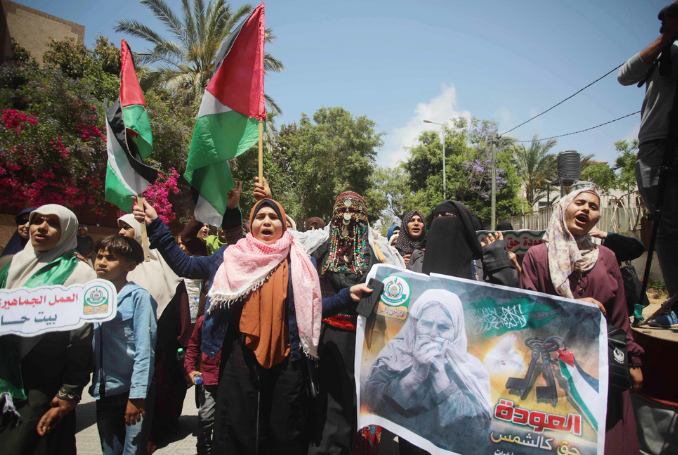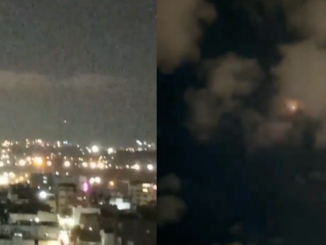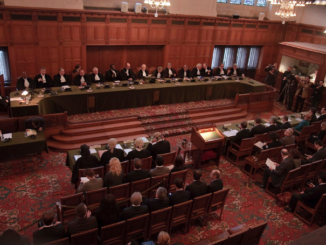
By Benay Blend
Without the inclusion of a “genuine and engaged” Palestinian perspective, Baroud explains, conversations will focus only on what benefits Zionist and US interests.
On August 15, 2017, former President Donald Trump commented on the recent violence committed by White Nationalists over the removal of the statue of Robert E. Lee, who was a general in the Confederate army during the Civil War. In his infamous “both sides” remark, Trump claimed that there were some “very bad people” on both sides, but some who came out to protest the removal of the statue were very “fine.”
In essence, Trump’s claim that participation in a “Unite the Right” rally, which saw marchers yelling such slogans as “White lives matter” and “blood and soil,” served as the moral equivalent of anti-racist demonstrators who took part in a wave of demonstrations that year which sought to bring down statues that they felt honored America’s racist past. At one point, a speeding car drove through the anti-racist group, killing 32-year-old Heather Heyer and injuring at least 19 others.
In a 1994 interview with Barbara Miner of Rethinking Schools magazine, the late historian Howard Zinn dealt with this issue of relativity: “Well, some people say this, some people say that, so there must be some truth to both sides.” Zinn replied that both sides were not always equally valid, but rather that more often one side carried moral weight than the other.
“I want [my students] to know,” Zinn concluded, “that if people don’t take a stand the world will remain unchanged, and who wants that?” This perspective applies to all forms of social struggle, but, in particular, the movement for the liberation of Palestine, a campaign shared by colonized people around the world.
More recently, Jonathan Greenblatt, CEO of the Anti-Defamation League (ADL), resorted to the “both sides” approach while discussing Israeli violence in occupied East Jerusalem. Writing for Electronic Intifada, Michael F. Brown accused the ADL director of “both-sides-ism” after Greenblatt referred to “hateful rhetoric” on the part of Jews as well as Palestinians during the Israeli flag day march in which Israelis yelled “Death to the Arabs,” and other similar slogans.
Significantly, Brown points out that Greenblatt “both-sided” the violence in Charlottesville, too, blaming both the alt-right and Antifa, in Greenblatt’s words, thus following a long-held pattern of censuring Palestinian and Black organizers for social justice.
In addition to the argument of “both sides,” which seeks to promote a moral equivalence between white nationalists and those they deem inferior, there is also an effort on the part of some Palestine solidarity activists to explain away Israeli violence as a result of “Jewish fear.” In Defamation (2009), Yoav Shamir attempts to document how fear is ingrained into Jewish children by the Israeli state, by their parents, and other means that all result in a society so paranoid that they believe the entire world outside of their own circle is antisemitic.
Shamir does not use his film to excuse but simply to explain how this has happened, and indeed hopes that his exposé will lead to Jews letting go of an “identity built on fear,” in the reviewer’s words, in order to live like “normal people.”
In his review of Rabbi Michael Lerner’s book, Embracing Israel/Palestine: A Strategy to Heal and Transform the Middle East, Douglas Jamiel uncovers a similar issue, but this time the problem is not a need for individual transformation but rather a call for healing a mass psychosis that Lerner believes inflicts Israelis. In the end, Jamiel’s critique of Lerner’s solution applies to both the notion of personal revelation as well as a transformation on a larger scale.
“A state is a secular construct,” he writes. As such, it does not respond to “religious precepts,” but rather should be judged according to political analysis, to which I would add so should the solution be found within the realm of material resistance, in this case to the Occupation. Jamiel continues that the American government, which itself separates church and state, ignores this division when it comes to Israel by subsidizing what is the “very fusion of the Jewish State.”
Whether or not fear guides the actions of the Zionist State, or perhaps it is religion that infuses it, both are immaterial considerations. There are many explanations as to the cause, but the problem comes when those accounts are used as rationalizations for abuse.
In a much-touted, recent letter, 48 members of Congress signed on “to voice [their] support and admiration for the groundswell of pro-democracy activism in Israel in recent months.” Backed by J Street, the signatories expressed concern that Netanyahu’s plans could “corrode Israel’s democratic character and, in doing so, strain the critical relationship between Israel and the United States.”
“It’s great to see Members of Congress express their unwavering solidarity with Israelis who are fighting to defend democracy,” declared Jeremy Ben-Ami, President of J Street. “The US-Israel relationship is rooted in shared democratic values. At a time when both countries face very serious threats posed by illiberal far-right movements, it’s critical that pro-democracy forces continue to recognize our common struggle and stand together.”
When the letter does mention Palestine, it does so with no attention at all to the reality of Palestinians in Zionist prisons. “The undermining of the Israeli judiciary’s independence is likely to threaten the civil liberties and religious freedom of all residents of Israel,” it claims, including Palestinians.
Anyone who believes that Palestinians receive justice under the current system has not followed the plight of the two sons of Iyad Burnat, both of whom remain in detention with their trial dates endlessly extended. These are only two of the many cases documented by Samidoun: Palestinian Prisoner Solidarity Network.
These members of Congress, along with their backer J Street, fail to mention how Palestinians figure into this picture of democracy. Like the “pro-democracy” protestors, they go beyond “two sides” to leave Palestine out of their agenda altogether, except to throw an occasional bone to the two-state solution, which has been off the table for quite some time. It might be true that the US and Israel share certain “values,” as the letter says, but given the nature of the aid that the former extends to allow the latter to displace and murder Palestinians, neither country could be called democratic.
From “two sides,” to personal/mass revelations, to leaving Palestine totally out of the equation, none of these agendas include Palestinians in the decision-making process. For these reasons, it is important to shift attention to “reclaiming the [Palestinian] narrative,” as Ramzy Baroud frames it, leaving behind solutions that fail to address the problem. As he explains,
“For many years, [Baroud], along with other Palestinian intellectuals, raged against the misrepresentation and marginalization of Palestine and the Palestinians, not only by Israel and its allies in mainstream media, but also against the elitism that existed within the Palestinian movement itself.”
Without the inclusion of a “genuine and engaged” Palestinian perspective, Baroud explains, conversations will focus only on what benefits Zionist and US interests, by using “their subsequent fraudulent language about ‘peace,’ security’ and such.” This “misleading narrative,” he warns, must be expunged from any serious discussion on Palestine.
For “Palestine to be free,” Baroud concludes, “ to achieve their full rights and for the Right of Return for Palestinian refugees to be honored,” the Palestinian narrative must be told by Palestinians themselves, not by the voices that currently adhere to “two sides;” “one side,” which is always the Zionist side; or the personal/mass epiphany side that uses psychological/religious metaphors to address the political problem of Occupation.

– Benay Blend earned her doctorate in American Studies from the University of New Mexico. Her scholarly works include Douglas Vakoch and Sam Mickey, Eds. (2017), “’Neither Homeland Nor Exile are Words’: ‘Situated Knowledge’ in the Works of Palestinian and Native American Writers”. She contributed this article to The Palestine Chronicle.







